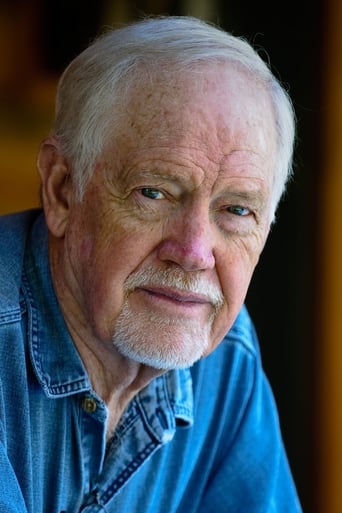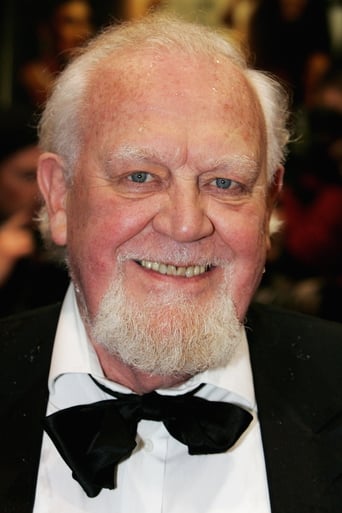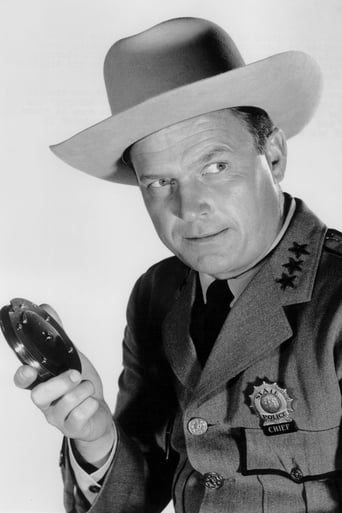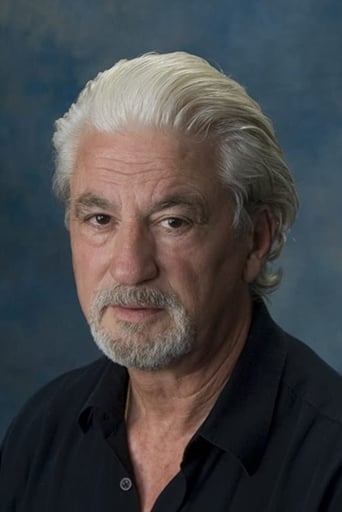Kattiera Nana
I think this is a new genre that they're all sort of working their way through it and haven't got all the kinks worked out yet but it's a genre that works for me.
Exoticalot
People are voting emotionally.
Stevecorp
Don't listen to the negative reviews
Odelecol
Pretty good movie overall. First half was nothing special but it got better as it went along.
Scott LeBrun
A young Christopher Walken brings his typically dynamic presence to this low key drama with a touch of sci-fi. He plays Private James Reese, an aggressive young soldier stationed in Germany who gets in trouble one too many times to suit his superiors. So they ship him off to a hospital in the country where Dr. Frederick (Joss Ackland), the man in charge, has come up with an experimental way to suppress hostile behaviour. Reese doesn't trust Frederick, and is suspicious of the whole set-up and location. The Army, represented by a Major (Ralph Meeker), is overseeing the whole thing and of course doesn't want anything jeopardizing their efforts.Those new to this film, such as this viewer, may be caught a little off guard with the nature of this film, which the advertising tries to sell as a horror movie. Well, there's some scary stuff in this story (based on the play by Dennis Reardon), but this is definitely not a horror movie in the traditional sense. It's quite deliberate in its pacing, and is very talky, so it may test the patience of some audience members. Still, it's often amusing, and interesting. A lot of the running time is devoted to portraying the evolving relationship between Reese and his live wire fellow patient Boford Miles (an incredible, standout performance by Ronny Cox). Miles is a very troubled individual, as we see from the kinds of things that he gets up to. It's a saddening moment for the character when he finally relents to being subjected to the experimental procedure, and you feel quite bad for him.Ultimately, the plight of these characters makes for fairly compelling material. The actors are all wonderful; Walkens' trademark personality shines through at some points, although he also gets a chance to do some really serious acting, in what was one of his earliest movie roles. Cox (who was also a relative newcomer to film, having made "Deliverance" previously) is excellent and he and Walken work well together. Ackland and Meeker are both solid as the well-meaning and not so well-meaning antagonists, character actor Marco St. John has a lively role as a jovial orderly, and Bette Henritze is touching as kindly nurse Anna Kraus.This may not be anything truly special, necessarily, but it's still potent and involving entertainment and fans of Walken and Cox will almost certainly want to give it a look.Seven out of 10.
MartinHafer
soldiers with facial hair? With a name like "The Mind Snatchers", I naturally assumed this was a film about space aliens abducting and scrambling the brains of folks. However, the film has absolutely nothing to do with this but is instead a slightly paranoid but thought-provoking film about psychiatric ethics.The film begins with a VERY obnoxious and angry soldier, Pvt. Reese (Christopher Walken) bullying and mistreating everyone. He's soon arrested by the military police and incarcerated for psychiatric tests to determine what his issues are. They diagnose him with a personality disorder (no duh!) and schizophrenia--and, without his permission, they ship him off to a very strange hospital where there appear to be only three patients. One is SERIOUSLY disturbed and a total mess. Another (Ronny Cox) is a sex offender. And, the third is Reese. What is this all about? No one tells Reese and he's left to wonder. And, through the course of the film, it becomes more and more apparent that the military is planning on doing some sort of insidious mind-control experiment on them! Despite a low budget and that the film is inexplicably set in Germany (I think this was due to funding), the movie has a very compelling script and has a lot of interesting things to say about abuses within psychiatry where, it seems, the end does justify the means. A very good and unusual film to say the least--and an interesting early Walken role. Well worth seeing, though I doubt if the average person would enjoy this. Me, with my background in psychology, I loved it and thought it brought up some very interesting concerns.
MARIO GAUCI
Interesting but hardly original drama with sci-fi leanings – though not quite the "horror"/"chiller" described by the ads! – involving the brain-washing of violence-prone subjects by the system (which must have seemed particularly trenchant at the time of the Vietnam war).At this juncture, however, the movie feels quite dated – if reasonably intelligent and compelling nonetheless. Being also relentlessly talky (not surprising, given its stage origins) and low-key in nature, there's a conspicuous lack of cinematic inventiveness – which doesn't really allow for a sensible comparison with Stanley Kubrick's stylized treatment of the same theme in A CLOCKWORK ORANGE (1971)! Still, it has some undeniably powerful moments – and the small cast is impressive: Christopher Walken (relatively inexperienced for this type of demanding role, but quite good in his Method approach to it); Joss Ackland (as the requisite mad scientist); Ralph Meeker (as the equally inevitable, and callous, military overseer); and Ronny Cox (as a fellow inmate of Walken's who, after much soul-searching, willingly submits to the dehumanizing experiment).Incidentally, the play was filmed under its original title – THE HAPPINESS CAGE – but this got changed (in case it was mistaken for an ode to hippiedom) first to the sci-fi friendly and, in retrospect, more appropriate THE MIND SNATCHERS and eventually to the horror-oriented (and, consequently, wholly misleading) THE DEMON WITHIN!
FilmFlaneur
CONTAINS SPOILERSThe best reason to see this is an early and characteristic performance by Christopher Walken. The film itself is a sombre, small scale piece, developed from a play. It betrays its origins through plenty of dialogue, some suspense, but little real action. This is one of those early seventies films revealing a fashionable anger against the industro-military complex, but which offers no radical agenda of its own. Like the director's 'Name for Evil' made around the same time, ‘The Mind Snatchers' is about mental confusion, but here the emphasis is on deliberate manipulation of the brain rather disorientation. There is no inexplicable mental collapse on show here. Instead we are confronted with a state-sponsored ‘trip', a mind control experiment, undertaken in Germany on American soldiers conveniently designated ‘psychotic' by the powers who need subjects to operate on. As the alienated and violent James Reese, Walken breaks his arm in a dispute with the Military Police and instead of the cooler, soon finds himself in an enigmatic hospital, one of only three patients.Outside of the opening scenes, showing Reese's fraught social interractions then arrest, and the last, showing him on display at a press conference, the film never leaves the institution's grounds. Shot atmospherically on location, the place is a large, empty echoing establishment, whose sanitorium-like atmosphere is at odds with the doom it threatens. It is a cold, efficient clinic, reminiscent of Cronenberg's world of white coated attrocities just starting on film at the same time. As a hospital it is as much understaffed as it is underpatiented (although barbed wire and dogs keep the few people in.) Besides Dr Frederick, the orderly Shannon, a nurse and red cross visitor, no one else is in evidence. For a supposed high priority government project this is disconcerting, to say the least. Like Reese we expect something more than this to rail against. He shares a room briefly with a third patient (whose unpredictable yells are a disturbing touch), then is left to interract with Miles, a sergeant with dangerous mood swings. A bond gradually forms between these two men - but not until Miles' health suddenly deteriorates and he has volunteered for the experiment, which has already killed the last patient.The cool, dangerous and distanced persona of Reese is perfect for Walken. This was his third film (after ‘The Anderson Tapes') and as the incarcerated Private he inculcates exactly the right degree of repressed rage and wariness the role demands. Although the film is dialogue heavy, the central relationship, that between Reese and Miles works well. Miles' taunting sexuality, nervous anticipation and jittery humour contrasts well with Reese's objective assessment of his exploitation. We sense Reese's reserves of strength, which makes the end of the film all the more shocking. As Miles, Ronnie Cox is also a strong character, but we know that he probably does not have the survival instinct of our hero, and his fate justifies our suspicions. Together the two hold the screen for long minutes, making it a shame that Joss Ackland's stodgy Dr Frederick lowers the suspense and tension on each appearance. In fact, Frederick's ignorance and belated conscience struggle, after `23 year's research on one small part of the human brain', is one of the least convincing aspects of the plot. Bemused and lethargic, he seems to have strolled in from a far more gentele story, and his concerned crackpot character never really catches fire. The same might be said for the oily Major, played by the normally excellent Ralph Meeker who has little to do here save trigger the experimentation on Reese.First however, it is Miles who is hooked up to the mind-snatching machine, which has an effect (albeit more sinister) similar to the ‘orgasmatron' familiar from Woody Allen's ‘Sleeper'. As a violence-inhibiter and psychosis-reducer, the effects of the self activated machine is certainly effective. It is described by Miles as like being in `a huge woollen glove', before he clutches his crotch in self-absorption. (`Get the bugs out and I'll be the first in line, Doctor' admits the grim Major with unconscious irony.) Reese has a greater sense of himself as an individual however, and initially refuses the treatment, saying `pain defines me – it makes me what I am'. The final press conference is abrupt and chilling. Reese is caught in a freeze frame while the Major proclaims blithely that `The Military is always interested in the betterment of Mankind', and so on. In a way which might have reflected the disbelief on the face of a contemporary audience, Reese's fate has been the loss of individuality, of emotion and power. This is an ultimate fate familiar from many other movie distopias, and is perhaps where the film most clearly reveals its roots. These days we may prefer our messages less hammered home, but for those who enjoy their brain washing movies cold and without the trimmings, this can be recommended.





